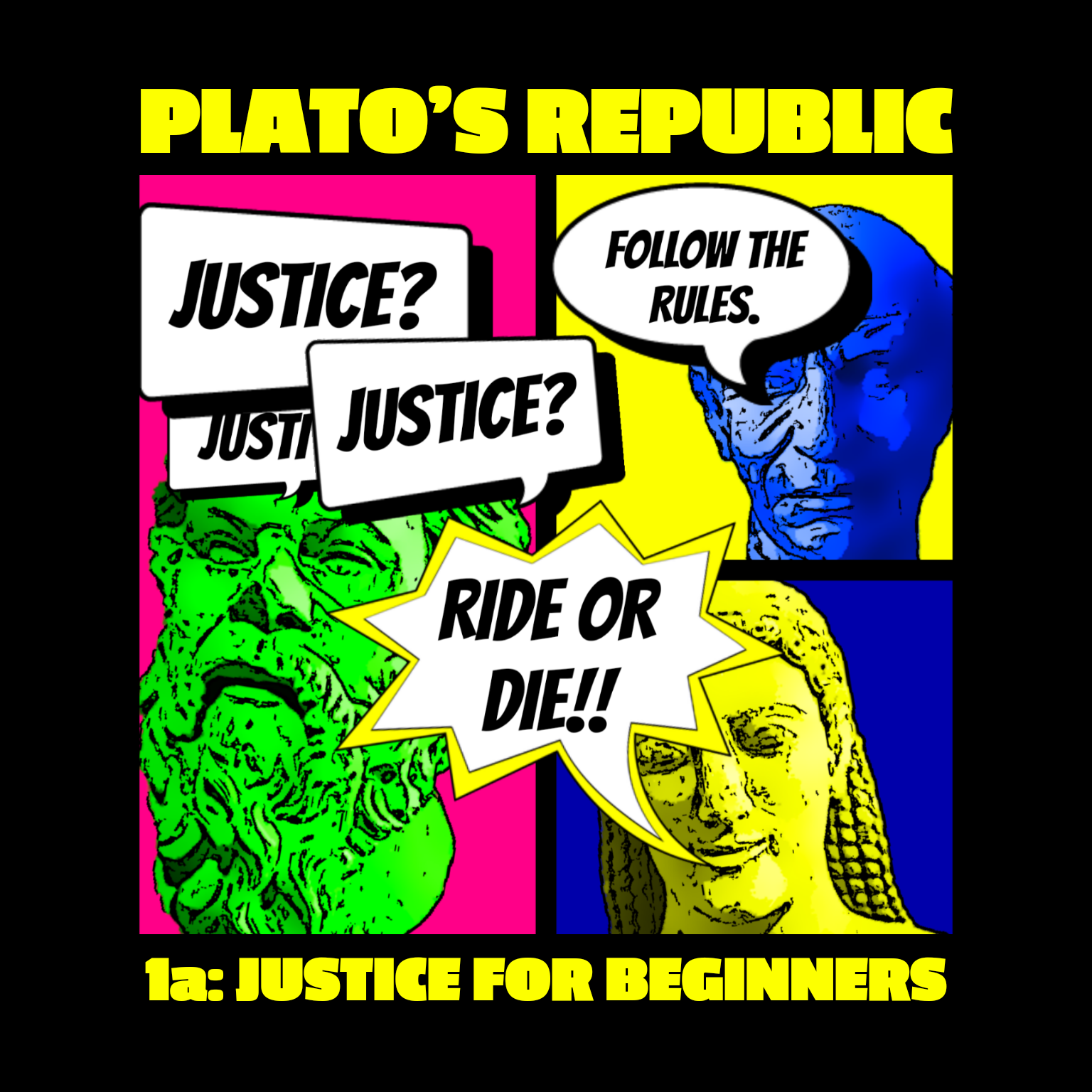The Esoteric Plato feat. Earl Fontainelle
Today I speak with Earl Fontainelle of the Secret History of Western Esotericism podcast (SHWEP).
I don’t understand Plato. Partly this is because he never writes in his own voice and partly it’s because I can’t even always tell when Socrates is joking or even what he’s talking about. The divided line? The Myth of Er? The tyrant being exactly 729 times less happy than the philosopher? These are all weird things in the Republic that are still mysterious to me.
Earl suggests that perhaps the reason Plato is so difficult to understand is because he was writing esoterically. Perhaps the dialogues contain secret messages directed to an initiated few and the weird passages I complain about actually contain wisdom of a higher order. Perhaps.
In this long and wide-ranging conversation, we talk about why so many readers of Plato believed he wrote esoterically, the secret meanings he may have been hiding, and a lot of the mysterious Plato math that I complained about in the Republic series.
Plato's Republic 13: Choose Yourself
This episode covers the last bit of book 10 of Plato’s Republic.
Imagine you get to choose your reincarnation. You can come back as a tyrant, a sports star, a swan, whatever you want. What do you pick? And what do you have to know to make a good choice?
Socrates has some advice. In this final episode of Republic, tell the story of a man who travelled to the afterlife and came back to tell the tale. This puts a didactic bow on the all-night conversation they’ve been having and demonstrates how Socrates thinks poetry should be written.
Plato's Republic 12: Poetic Sweet Tooth
Socrates thinks that poetry is like candy: delicious but bad for us. If we consume too much, it’ll rot our souls. That’s because the poets just pander to our passions with no concern with or knowledge of the truth.
But pandering poets aren’t the problem. It’s us. Socrates thinks that humans have a poetic sweet tooth that makes certain kinds of stories irresistible to us. We let ourselves get carried away by them and start to believe that they’re true. Following our natural taste for art undermines reason and makes us into worse people. So how do we live if we can’t trust our taste?
Plato’s Republic 9: Horny for the Good
This episode covers book 7 of Plato's Republic.
Socrates is what I call a “philosopher of desire.” He cares more about the questions than the answers, the journey than the destination, the boner than the nut. And he brings that energy to his teaching.
In this episode, Socrates tells the boys that the “form of the good” is the one thing that anyone who wants to live a good life absolutely needs to know about. So what is it? Glaucon wants to know so badly he yells out to Apollo and begs Socrates to tell him. But Socrates won’t go all the way. Instead, he teases Glaucon with the analogies of the sun, line and cave which also happen to tell us about: the invisible forms; the nature of human knowledge; and why STEM subjects should only be used as prep for philosophy.
Get your goggles on, because this is a deep one.
Plato’s Republic 7: Socratic Family Values
This episode covers book 5 of Plato’s Republic.
What do you do when the private family causes too much corruption? Nationalize it! Create a giant family monopoly that includes every citizen in one giant clan. In this episode, Socrates explains his most normal proposal—that women should have jobs—and his most shocking, which involves a state eugenics program disguised as a religious festival.
This chapter makes some people think Plato’s a feminist and other’s say he’s a fascist. Either way, it shows us that values like family loyalty, political unity, gender equality, and meritocracy do not always fit well together.
Plato’s Republic 5: Lies, Noble Lies and Gymnastics
This episode covers the second half of book 3 of Plato’s Republic. Glaucon and Socrates develop a completely immersive education program for the guardians that controls every aspect of their social and physical environment. Then, they tell them it never happened because actually they were sleeping underground being built by the god to defend the city. Glaucon doubts anyone would believe this “noble lie,” but Socrates isn’t too worried. Ideology finds a way.
Plato's Republic 4: Myths 4 KidZ
This episode covers parts of books 2 and 3 of Plato’s Republic. Adeimantus and Socrates start planning an education for the guardians. As it stands, young Athenians are fed an unhealthy banquet of lies written by the likes of Homer and Hesiod. Socrates wants new lies that set a good example for the kids. Lies with less fighting and sex and crying. Boring lies. And they might be for adults too.
Plato’s Republic 3: City of Pigs, Army of Dog
This episode covers the first part of book 2 of Republic. Glaucon and Adeimantus take over the conversation with Socrates and challenge him to prove that it’s good to be good. Glaucon gets wild with a ring of invisibility. The gang builds a utopian city of pigs and meets an army of good-natured dogs.
Interview: Paul Sagar, What's Your Problem With Plato?
Paul Sagar is a lecturer in political theory at King's College London and the guy who played Thrasymachus in book 1.
He actually doesn't like reading Plato very much. I ask him why.
Plato’s Republic 2: Good to be Bad
In this episode, Socrates goes up against his most formidable opponent yet: the sophist Thrasymachus.
Thrasymachus leaps at Socrates “like a wild beast” and yells at him for playing dirty. Then, he tells the boys that morality is a lie and that they should do as much injustice as they can get away with.
Socrates responds by winning the argument in the least persuasive way possible.
Plato's Republic 1: Justice for Beginners
Plato’s Republic is full of bad arguments and worse political proposals and it may still be the most influential work of political theory ever.
Book 1 sets the stage for an all-night conversation between Socrates and some friends that covers: ethics; politics; education; epistemology; psychology; and a whole lot more.
It all gets started with the question “what is justice?”
Interview with Rebecca Goldstein
Rebecca Goldstein wrote a book of Platonic dialogues, in which Plato is on a 21st-century book tour in America. It’s called Plato at the Googleplex.
We talk about Plato and whether you can do philosophy and politics at the same time, and the Harper’s letter in favour of “open debate” that Goldstein signed and Twitter got mad about. We discuss when, if ever, it’s a good idea to constrain free speech and inquiry.
Plato’s Apology 5: The Apology of Athens
Executing an innocent 70-year-old philosophy might look bad but you had to be there.
Topics include:
Why a reasonable, well-intentioned Athenian may have voted to kill Socrates.
Why politics might get interested in you, even if you’re not interested in politics.
The difference between morality tales and philosophy tales.
Plato’s Apology 4: Your Brain on Politics
A lot of Athenians suspect Socrates of plotting to overthrow democracy. On the other hand, Socrates says that when Athenians start thinking politics, they turn into a paranoid mob. This episode covers both sides and it honestly sounds like Socrates is complaining about Twitter.
Topics:
-Why people who are into politics are so annoying.
-How the “political mindset” differs from the “philosophical mindset.”
-Whether Socrates is an enemy of the state.
Plato’s Apology 3: Not-So-Dangerous Minds
Some people think that philosophy is an outrage to religion and a danger to morality. Was this why the Athenians killed Socrates? Are these ever good reasons to kill a philosopher? Do people say philosophy is dangerous just to make it sound sexier?
Plato’s Apology 2: Free Speech Hero?
Socrates insults his jury, dares them to sentence him to death, then makes fun of them when they do.
Unswerving commitment to truth? Troll’s defence? Suicide by jury? All of the above?
Plato’s Apology 1: The Divine Troll
Socrates, daddy of Greek philosophy, is on trial for impiety and corrupting the youth.
According to him, his only crime was trolling the city of Athens.
The Apology is an account of Socrates’s court defence, told by his student Plato. This is part 1 of a 4-part series on this book.
















